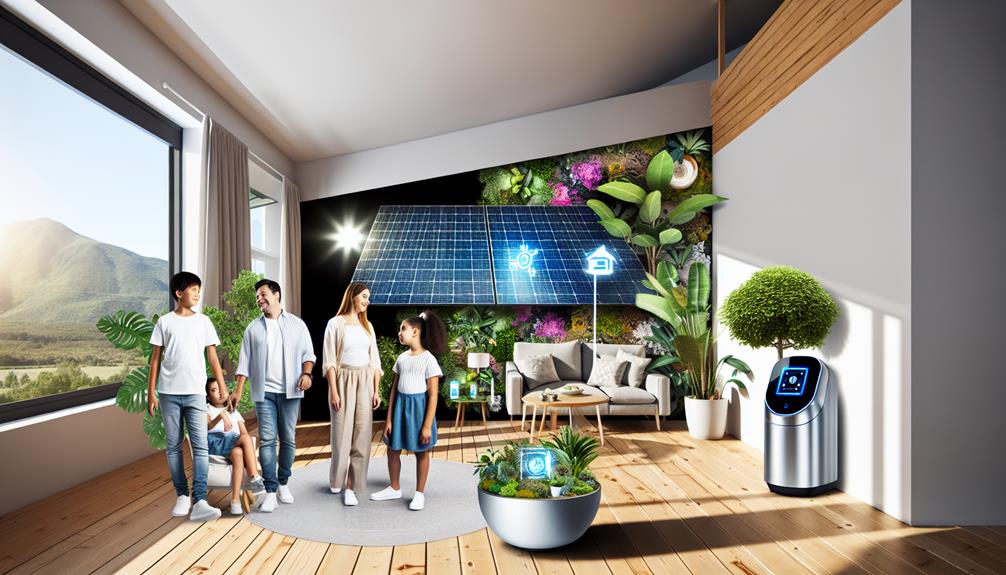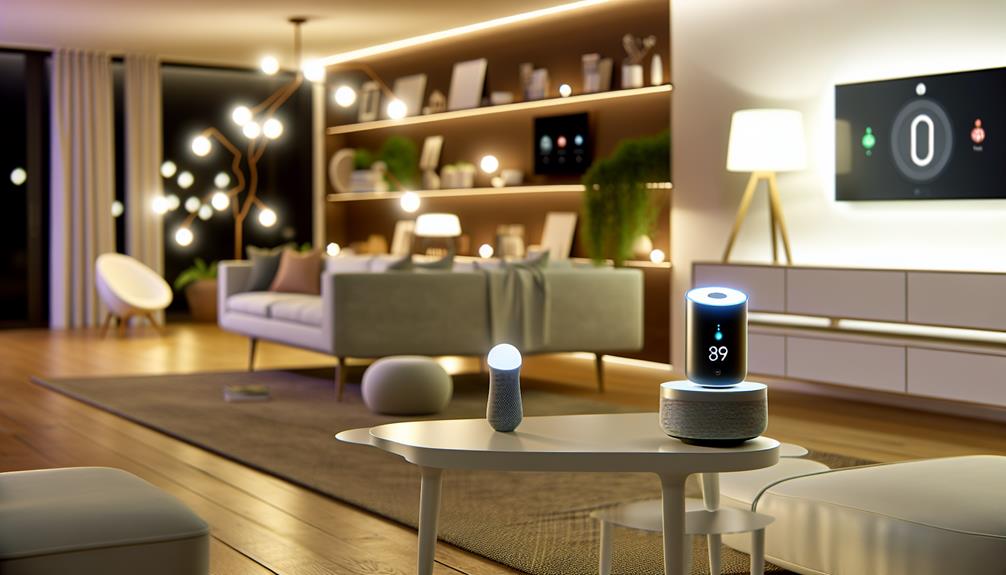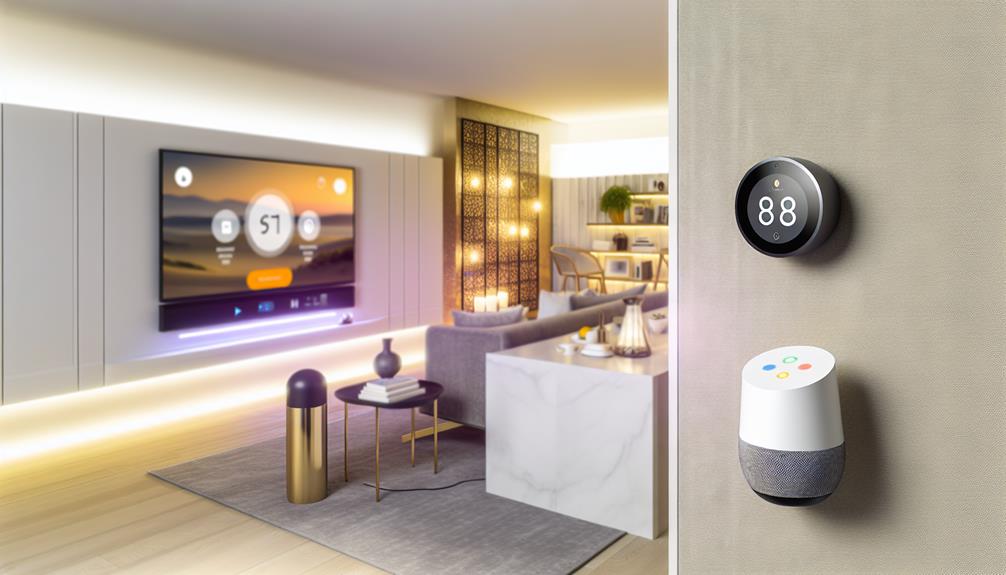How to Embrace AI for Energy-Efficient Living
The integration of artificial intelligence into our daily lives presents a significant opportunity for enhancing energy efficiency. By utilizing smart technologies such as thermostats, lighting systems, and intelligent appliances, individuals can optimize their energy consumption while maintaining comfort. These innovations not only promote sustainability but can also lead to substantial cost savings. As we explore the various applications and future trends of AI in this setting, it becomes clear that the potential for transforming our approach to energy usage is both promising and complex. What specific strategies can we implement to maximize these benefits?
Key takeaways
- Implement smart thermostats to monitor and adapt temperature schedules, optimizing energy use based on occupancy and historical data.
- Utilize AI-powered lighting solutions that adjust brightness dynamically, reducing waste while maintaining comfort and productivity.
- Adopt intelligent appliances that optimize energy consumption with real-time data, promoting efficiency in daily tasks and reducing utility bills.
- Monitor energy usage with advanced analytics to identify inefficiencies and implement predictive maintenance, preventing costly repairs and enhancing sustainability.
- Foster community engagement by sharing energy consumption patterns and promoting collective responsibility for energy-efficient living through smart technology adoption.
Benefits of AI in Energy Efficiency
In the domain of energy efficiency, the integration of artificial intelligence (AI) offers transformative benefits that extend beyond mere cost savings. AI technologies enable the optimization of energy consumption across various sectors, facilitating a shift towards sustainable practices that not only lower expenses but also support the widespread adoption of renewable energy sources.
This integration allows for intelligent forecasting and management of energy production and consumption, leading to enhanced grid stability and reduced reliance on fossil fuels.
Moreover, AI's predictive analytics capabilities empower organizations and individuals to identify patterns in energy usage, thereby enabling informed decision-making that minimizes their carbon footprint. By leveraging AI-driven insights, consumers can adjust their energy habits, maximizing efficiency while contributing to a greener future.
As communities increasingly embrace AI technologies, the collective impact on energy efficiency is profound. The shift to smart energy solutions fosters a sense of belonging among individuals and organizations committed to sustainability.
Smart Thermostats for Optimal Control
Smart thermostats represent a pivotal advancement in energy management, offering both energy usage monitoring and adaptive temperature scheduling to optimize home climates.
By continuously analyzing usage patterns and external conditions, these devices enable homeowners to make informed adjustments that reduce energy consumption.
This proactive approach not only enhances comfort but also greatly contributes to energy efficiency and cost savings.
Energy Usage Monitoring
Energy usage monitoring has become a pivotal component in the quest for efficient living, particularly through the implementation of advanced thermostats that optimize temperature control. These smart devices utilize real-time analytics to assess energy consumption patterns, granting users the ability to make informed decisions about their home environments.
By providing immediate feedback on energy usage, these thermostats foster user engagement, allowing individuals to actively participate in their energy efficiency journey.
Furthermore, the integration of AI in energy monitoring facilitates predictive models that adapt to user behaviors, ensuring that homes remain comfortable while minimizing waste. For instance, users can receive alerts when energy consumption exceeds normal thresholds, empowering them to make real-time adjustments.
This not only promotes a sense of belonging within a community focused on sustainability but also encourages collective action toward energy conservation.
Ultimately, energy usage monitoring through smart thermostats serves as a cornerstone for sustainable living, aligning technological advancements with the desire for more responsible consumption.
As more individuals embrace these solutions, the cumulative impact can lead to significant reductions in overall energy demand, contributing to a healthier planet for all.
Adaptive Temperature Scheduling
Adaptive temperature scheduling represents a transformative approach to home climate control, enabling users to achieve ideal comfort while maximizing energy efficiency. This innovative technology harnesses the power of smart home integration, allowing thermostats to learn individual preferences and adjust settings accordingly.
Through machine learning algorithms, these systems analyze historical data, occupancy patterns, and even external weather conditions to deliver personalized comfort tailored to your lifestyle.
By implementing smart thermostats, homeowners can notably reduce energy consumption during peak hours or when the residence is unoccupied. This not only translates to lower utility bills but also contributes to a more sustainable environment.
The ability to remotely control and monitor temperature settings through mobile applications further enhances user experience, fostering a sense of belonging to a community that prioritizes energy efficiency.
Moreover, adaptive scheduling can be easily integrated with other smart home devices, creating a seamless ecosystem that promotes convenience and control.
As we collectively endeavor for energy-efficient living, embracing these advanced technologies will empower individuals to cultivate a more comfortable and sustainable home environment, ultimately leading to a healthier planet for future generations.
AI-Powered Lighting Solutions
AI-powered lighting solutions represent a significant advancement in energy efficiency, leveraging smart lighting controls to optimize usage based on occupancy and time of day.
These systems can automatically adjust brightness levels, ensuring proper illumination while minimizing energy waste.
Smart Lighting Controls
How can intelligent lighting solutions transform our living spaces while simultaneously reducing energy consumption? Smart lighting controls, powered by artificial intelligence, offer a revolutionary approach to managing our home environments.
Automated lighting systems can be programmed to adjust based on occupancy, time of day, or natural light availability, ensuring that energy is used efficiently. By eliminating unnecessary lighting, these systems facilitate substantial energy savings without compromising comfort or ambiance.
Moreover, the integration of smart lighting into our daily lives fosters a sense of community and belonging. As we collectively embrace these technological advancements, we contribute to a more sustainable future.
The ability to control lighting remotely through smartphones or voice commands enhances convenience and encourages mindful energy use.
Incorporating automated lighting solutions not only minimizes our carbon footprint but also promotes an awareness of energy consumption patterns. This awareness can inspire families and communities to adopt further energy-efficient practices, creating a ripple effect that benefits the environment.
Adaptive Brightness Features
The evolution of smart lighting controls paves the way for more sophisticated enhancements, such as adaptive brightness features that dynamically adjust light levels based on real-time environmental conditions.
These AI-powered lighting solutions not only enhance user comfort but also contribute considerably to energy efficiency.
Implementing adaptive brightness features brings tangible benefits to households and communities, including:
- Optimized Energy Use: Automated adjustments make sure that lighting is only as bright as necessary, reducing electricity consumption.
- Enhanced Comfort: Adaptive screens adjust brightness to complement natural light, fostering a more pleasant living space.
- Improved Focus and Productivity: Properly lit environments can enhance concentration, making work and study areas more effective.
- Sustainability: By minimizing energy waste, these solutions align with a collective commitment to environmentally responsible living.
As we embrace these innovations, we foster not only individual well-being but also a sense of belonging to a community that values sustainability.
The integration of adaptive brightness features represents a shift towards a more conscious lifestyle, where automated adjustments lead to both comfort and ecological responsibility.
Energy Monitoring Systems
An increasing number of households and businesses are turning to energy monitoring systems as a critical tool for optimizing energy consumption and enhancing sustainability. These systems provide real-time analytics that empower users to understand their energy usage patterns, facilitating informed decisions about energy conservation.
By analyzing data on energy consumption, users can identify inefficiencies and make necessary adjustments, contributing to both cost savings and reduced environmental impact.
Furthermore, energy monitoring systems often incorporate predictive maintenance features, which can alert users to potential issues before they escalate into costly repairs or energy waste. This proactive approach not only guarantees that appliances and systems operate at peak efficiency but also extends their lifespan, promoting a sustainable lifestyle.
The integration of these advanced technologies fosters a sense of community among users, as they share insights and strategies for maximizing energy efficiency.
Intelligent Appliances for Sustainability
Building on the insights gained from energy monitoring systems, intelligent appliances represent a significant advancement in the quest for sustainable living.
These appliances, including cutting-edge robotic kitchens and other eco-friendly innovations, are designed to optimize energy consumption while enhancing our daily lives. By harnessing AI technology, they not only promote sustainability but also foster a sense of community among environmentally conscious individuals.
Consider the following benefits of intelligent appliances:
- Energy Efficiency: They adjust their operation based on real-time data, minimizing energy waste.
- Convenience: Smart functionalities streamline meal preparation, allowing users to enjoy healthy, home-cooked meals with ease.
- Cost Savings: By reducing energy consumption, these appliances lead to lower utility bills, making sustainability economically feasible.
- Environmental Impact: By choosing eco-friendly innovations, users contribute to a collective effort in reducing carbon footprints.
As we embrace these intelligent appliances, we not only enhance our own lives but also join a community dedicated to sustainable living.
This commitment to innovation helps forge connections among like-minded individuals, making the journey toward energy-efficient living a shared and fulfilling experience.
Future Trends in Smart Gadgets
As consumers increasingly prioritize sustainability and efficiency, a notable shift is occurring in the development of smart gadgets. The trend towards smart home integration is gaining momentum, with devices designed to work seamlessly together, creating a cohesive ecosystem that enhances energy management. This integration not only simplifies user experience but also maximizes energy efficiency, allowing homeowners to monitor and control their consumption in real-time.
Wearable technology also plays a significant role in this evolution. Devices such as smartwatches and fitness trackers are being engineered to track environmental impact, giving users insights into their energy usage patterns. This data empowers individuals to make informed decisions, fostering a community-driven approach to sustainability.
Moreover, advancements in AI algorithms are enabling predictive analytics, allowing smart gadgets to anticipate user needs and optimize energy consumption accordingly. As a result, the future of smart gadgets is not merely about convenience; it is about fostering a collective responsibility towards energy-efficient living.
Frequently Asked Questions
Can AI Help Reduce My Carbon Footprint at Home?
AI can revolutionize your home's energy efficiency, making carbon reduction effortless. By utilizing smart appliances and energy monitoring systems, you can optimize resource usage, greatly decreasing your carbon footprint while fostering a sustainable living environment.
How Can I Integrate AI Into My Existing Energy Systems?
Integrating AI into existing energy systems can be achieved by implementing smart thermostats and energy monitoring solutions. These technologies optimize energy usage, enhance efficiency, and foster community engagement in sustainable practices, ultimately contributing to a greener future.
Are There Privacy Concerns With AI Energy Solutions?
Steering the landscape of AI energy solutions resembles a delicate dance, where data security, user consent, and algorithm transparency must harmonize with privacy regulations. Safeguarding personal data is essential for fostering trust in energy monitoring systems.
What Is the Cost of Implementing AI for Energy Efficiency?
The cost of implementing AI for energy efficiency involves an initial investment, which can be significant. However, this expenditure often leads to substantial long-term savings through optimized energy usage, making it a prudent financial decision for many organizations.
How Do I Choose the Right AI Technology for My Needs?
Choosing the right AI technology involves evaluating personalized recommendations that align with your specific requirements, alongside the integration capabilities of smart appliances. Analyzing these factors guarantees enhanced energy efficiency and tailored solutions for your living environment.



